David Poole’s Wall Street Journal crossword, “Barmen”—Jim P’s review
Theme: Famous men whose last names are (parts of) names of cocktails. This is hinted at with 35a COCKTAIL PARTIES [Evening socials, or a punny description of 17-, 23-, 50- and 57-Across], implying that these men are “party” to “cocktail” creation. Is it also implying that the thematically pertinent part of the names of these men (who presumably have the first half of the first word) appears at the “tail” end of the theme entry? Maybe not, but my mind is in the gutter, and that’s usually where it stays.
- 17a [“Hacksaw Ridge” director] MEL GIBSON
- 23a [Seven-time Emmy nominee for “Seinfeld”] JASON ALEXANDER
- 50a [Apollo 11 astronaut who did not walk on the moon] MICHAEL COLLINS
- 57a [Director of 2007’s “Halloween” remake] ROB ZOMBIE
I was going to complain that I didn’t think a brandy Alexander was ever called just an “Alexander,” but Wikipedia tells me otherwise. Same with a Tom Collins. So the theme seems solidly consistent in that regard.
However, I don’t really see the need for all the theme entries to be men. The title could be changed to simply “Bartenders” and maybe then you could include Debbie or Althea Gibson or Joan or Judy Collins. It would all depend on symmetry. Maybe what we have in the grid is the best set possible. I don’t know. Or is it really that cocktail thing I alluded to earlier?
But as if to try to balance things out, the grid gives us KATHLEEN Turner, IMELDA Marcos, the operatic CARMEN, fictional Jane EYRE, LYNNE Cheney, Issa RAE, Yoko ONO, and Aimee MANN. But then these are further countered by AXL Rose, CAMUS, Matt LE BLANC, actor Danny PINO (don’t know him), IRA Gershwin, and a generic AXEMAN. So yeah. A lot of names with most of those falling on the testosterone side.
I liked BIG ASK [Difficult demand to fulfill] and GALILEE elsewhere in the fill. I could do without entries like AREEL [Staggering] because where have you ever heard or read that word except in crosswords.
Clues of note:
- 27a. [Predators’ target]. PUCK. I’m assuming this is a hockey clue because it didn’t make sense during the solve. Ah, Nashville, I see.
- 11d. [Ferdinand’s wife]. IMELDA. Who else put ISABEL here only to question it because you thought it should be ISABELLA? Good misdirection on this one.
The theme is fine, it just didn’t do a whole lot for me. Perhaps if it was a bit more balanced. 3.4 stars.
Ali Gascoigne’s New York Times crossword—Amy’s write-up
Look! It’s a rebus puzzle on a Wednesday. The theme revealer’s YOU ARE HERE, and there are {UR} rebuses within the other three long answers, plus in the Paul Lynde spot.
- 17a. [Cookout option for someone avoiding red meat], T{UR}KEY B{UR}GER. Crossings are SO{UR} and RO{UR}KE.
- 11d. [Mental operation?], NE{UR}OS{UR}GEON. I like the clue for the crosser FRAYED, but [Like some ropes and nerves] sorta dupes NEURO. Crossings: D{UR}ST and {UR}LS. Can’t help thinking Fred Durst of Limp Bizkit is more broadly famous than Robert Durst.
- 27d. [Wolfgang Puck, e.g.], RESTA{UR}ATE{UR}. If I had a nickel for every time I’ve heard someone pronounce that word as if there’s an N between and A and T, even on public radio, I’d have enough to dine out. Crossings: {UR}SINE, SL{UR}P.
- 36a. [Practical, stubborn, ambitious sort, so it’s said], TA{UR}US / 28d. [Actress Metcalf of “Lady Bird”], LA{UR}IE.
- And, sort of randomly plunked in the final corner, there’s E{UR}OS and HE{UR}E.
Theme works fine, yep.
Now, what’s the first thing the solver encounters in a crossword? It’s usually the clue for 1-Across. Imagine my surprise when ASAP was clued [“Chop-chop!”]. People! It was just a week ago, wasn’t it, when CHOP(-chop) was in the HALF OFF theme, and we talked about the racist/classist tinge to the term? So why the hell would the editor have it in this puzzle? You gotta f&$%ing learn from your mistakes, grow and evolve. You repeat a problematic term, and it leaves your audience to suspect that you don’t give a hoot if it offends anyone.
Fave fill: PEEKABOO, THANK YOU, HEAD CHEF.
Three more things:
- 15a. [Title heroine of a 2016 Disney film], MOANA. I enjoyed the movie when I finally saw it. I am still overdue on Coco and Zootopia! The down side of your kid growing up is that you don’t catch all the animated movies when they first come out.
- 26d. [French city whose last two letters are silent], ARLES. I don’t trust the French language. Why are you wasting our time with all these letters that don’t get pronounced? Just lop ’em off. ARL. See? Clean and simple. HEURE, another perpetrator.
- 41a. [Org. whose workers look into cases], TSA. Suitcases, specifically. And briefcases. Have any of you flown lately? How are the TSA lines? Are the TSA crews somewhat furloughed, or are there way more agents on duty than the traveling population needs? Me, I haven’t been more than about 5 miles from home in over 7 weeks.
Four stars from me, and a firm debit in the editorial zone.
Greg Johnson’s Universal crossword, “Initial Parts” — pannonica’s write-up
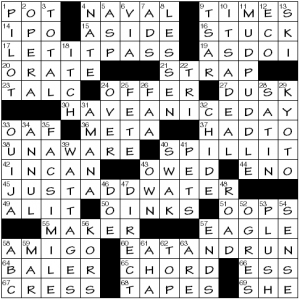
Universal • 5/6/20 • Wed • “Initial Parts” • Johnson • solution • 20200506
What I like about this theme is that all the phrases are very common and quite natural-sounding. Nothing forced or weak about them. The constructor happened to notice—collecting them over time, perhaps?—that their initial letters spell out body parts.
- 17a. [*Not react to something (not each starred answer’s “initials”!] LET IT PASS (lip).
- 30a. [*Well-wisher’s words] HAVE A NICE DAY (hand).
- 45a. [*Simple drink mix direction] JUST ADD WATER (jaw).
- 60a. [*Take off after a quick meal] EAT AND RUN (ear).
Sure, they’re all short words, but it’s only a 15×15 grid.
- 20a [Speak to an audience] ORATE, 15a [Remark to an audience] ASIDE.
- 27a [Twilight time] DUSK.
- 36a [Like a film about film] META. The industry has been making these almost since the inception of the technology.
- 66a [Lion’s tail?] ESS. Hey! I thought, it ends with an EN—did they make a mistake with the possessive? But then of course I realized the clue was insinuating the suffix -ESS.
- 11d [Small, dirty pool] MUD PUDDLE.
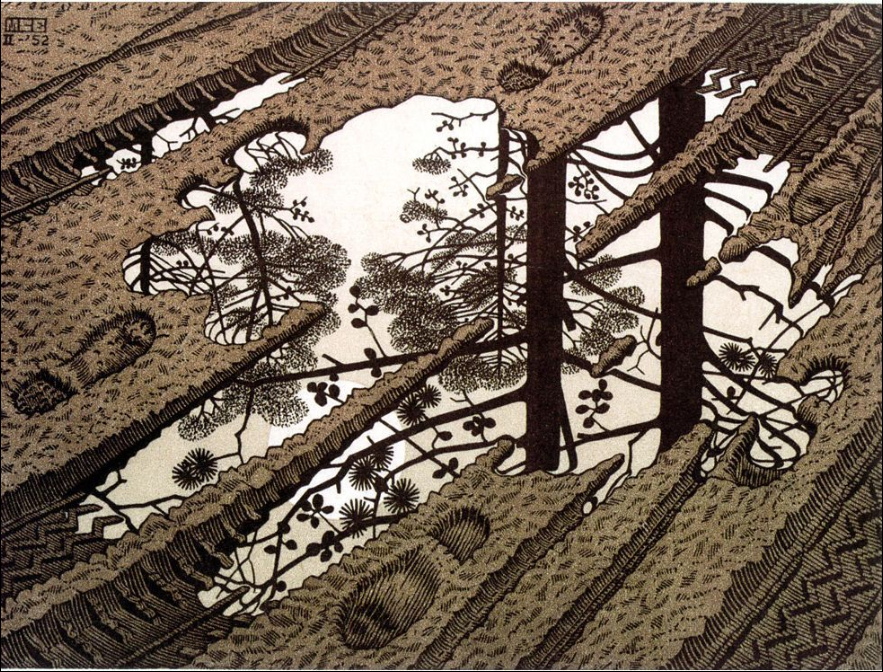
- 33d [Spiritual board] OUIJA. Uh-huh, uh-huh, sure.
- 48d [Part of a city grid] ROAD. I tend to think of streets as being more prevalent, but that in no way obviates city roads.
- Most of the clues are straightforward, but there a few question-markers: 10d [Words said while shaking?] IT’S A DEAL, 47d [Lead in a movie?] DIRECT, plus the lioness clue, above. Also a bunch of quotey exclamation-marked ones: 40a [“Tell me already!”] SPILL IT, 51a [“I goofed!”] OOPS, 32d [Say “No, no, no!” to] CHIDE, 43d [“Mind your __ business!”] OWN, 61d [“I solved the mystery!”] AHA. They help spice up the solving experience.
Just as I ended Monday’s write-up with something a bit raucous, here’s another. It goes with HAVE A NICE DAY and OOPS. (30a, 51a)
Hope I haven’t ruined your day.
Kevin Christian & Mangesh Mumbaikar Ghogre’s LA Times crossword – Gareth’s summary
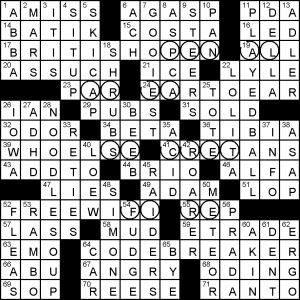
LA Times
200506
Although “words that follow” themes are pretty standard in the LA Times, this one lends a bit of variety to the genre by hiding the entries between two words. The revealing answer is CODEBREAKER, and, as indicated by the circles I have added, four “___ CODE” words are hidden in the puzzle. The weakest of the four is SECRET, which is the same kind of code as CODEBREAKER. A common problem with this theme variant is more utilitarian long theme answers, but here we get EARTOEAR and FREEWIFI (as a real-world phenomenon, I don’t fully understand it though.)
The grid design was, in the main, cleverly balanced allowing an extra pair of long answers: PLAYEDBALL and NOODLESOUP. The big trade off in this arrangement was roll-your-own, ROARER, which was basically locked in by having R??R?R formed by three theme entries.
Gareth
Francis Heaney’s AVCX, “Ooo-eee!” — Ben’s Review
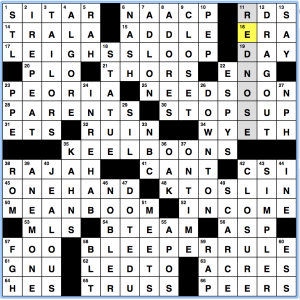
AVCX 5/6/20 – “Ooo-eee!”
I spent a BUNCH of my solve time on this week’s AVCX trying to figure out what I was missing. AS usual when that happens, writing it out cracked the nut:
- 17A: Actress Janet’s single-masted sailboat? — LEIGH’s SLOOP
- 25A: Gotta have, PDQ? — NEED SOON
- 35A: Things that are unexpectedly beneficial to the bottom of a ship? — KEEL BOONS
- 50A: Explosion that’s the average of all explosions? — MEAN BOOM
- 58A: Guideline for knowing when to censor someone on TV? — BLEEPER RULE
This one’s a little tricky to explain. Each of these answers has an “EEE” sound, and an “OOH” sound, but swapped around. If you swap them back, you get a more sensible phrase:
- LEIGH’S SLOOP -> LOSE SLEEP
- NEED SOON -> NUDE SCENE
- KEEL BOONS -> COOL BEANS
- MEAN BOOM -> MOON BEAM
- BLEEPER RULE -> BLOOPER REAL
KT OSLIN sings “80’s Ladies”, a song I expected would not have come out in the 80s (it came out in 1987)
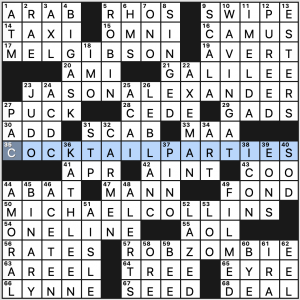
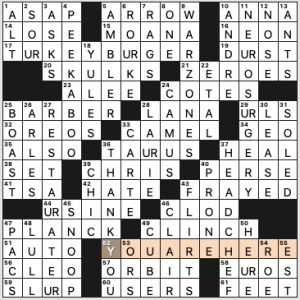
The linked article does not imply to me that “chop chop” is offensive. It says it was used by a racist character to condescend a black character, that doesn’t mean the word itself is racist. It says it was associated with class in the 1800s but then it goes on to describe how the meaning evolved after that.
In fact, I would say the condescending way you are speaking on behalf of Asians about what is racist, is in fact more problematic than the phrase “chop chop”.
KRUSTY THE CLOWN: Bart, I need your fingerprints on a pair of candlesticks. Meet me in the conservatory chop, chop! Don’t worry, everything will be alright…
Phil, if you read my post last week, you’d see that learning about the phrase’s troubled layers was new to me.
It was hearing someone else raise questions about it that prompted me to ask my Asian American husband about it. His reaction was instantaneous and negative. So I’m not condescending to Asians, I’m taking to heart how one Asian responded to the term.
I am Asian-American, and my reaction was also an instantaneous negative one. I think most Asian-Americans would have a problem with it. Chop-chop is what the white, wealthy person says to the servant of color. It is not a neutral term. It would be a major issue if a white person told me to do something, “chop-chop.” It should not be in the puzzle.
Disgusting to see “chop chop.” Once again a tin ear at the Times. Do we think this clue came from Al or Will?
It is tough for editors because iMO almost any word – when said a certain way – can bother someone. Brings to mind football players who say “THE” Ohio State University and the other players who mock it.
I once had a word rejected by the Quote Unquote guys…CLAMBAKE…because of a slang meaning. Depends where your mind is I guess.
You can only clue and hope. And find out about the FUCSHIA story (before my time) but I read of it.
Intro-level rebus NYT, a lot of not so easy top third names add the difficulty. This one became a quickie with the gimme revealer.
WSJ – funny that this morning I was thinking of a cocktail-based puzzle before I opened my paper and here is a really thinly-themed one. Not the worst puzzle I’ve seen. I knew the names cold, SpaceNut as a kid, but MIKE and IRON MIKE (COLLINS) didn’t fit … third time a charm
I learned RESTAURATEUR, word-heathen that I am
I was happy to learn that a fletcher is a person who makes ARROWs.
+1
NYT felt like smooth sailing since I found the rebus early, but then I finished and saw I was a bit slower than my Wednesday average. It never felt difficult, so I’m not sure where I lost time (aside from fiddling with the rebus squares). How odd.
Speaking of those silly French people and their silly language — why doesn’t ‘restaurateur’ have an ‘n’ in it? The word ‘restaurant’ is what the French use and we have borrowed.
MW says restauranteur occurs fairly frequently in English.
If I had to guess — in 20 years dictionaries will consider both spellings acceptable and in 50 years the ‘n’ spelling will predominate. It feels more natural to treat the word as a derivation of “restaurant” which means that, eventually, the rules will catch up with the usage.
I think this is a terrific introduction to rebuses for those still working their way up to Thursdays
I certainly hope you’re wrong, Ethan. A restaurateur restores you by feeding you.
All I could think of after reading Amy’s NYT review was how long it had been since I saw the center square called “the Paul Lynde spot”. I just googled that he occupied it most of the time from Hollywood Squares debut in 1966 until it was cancelled in 1981.
I’m white, but grew up in racially mixed Los Angeles. I agree with Abe that the only time I heard the term “Chop chop” was what the rich white man in a movie said to an Asian servant. Drop the term, it doesn’t pass the breakfast test.
Also said by Judge Smails in Caddyshack I believe
Which gives it legitimacy? I might not have understood your point.
Proves that it hasn’t aged well. It’s insensitive unless clued like
Rhythmic chant by one with a cleaver (?)
Even then…
Clue ia easily replaced.
AVX – Just did it this morning. Thought meh, OK. Then read Ben’s review. Understanding the sound reversal trick gives the puzzle a new layer of fun. Thanks Ben (And Francis).